A PUBLICATION OF THE EVANGELICAL LUTHERAN SYNOD
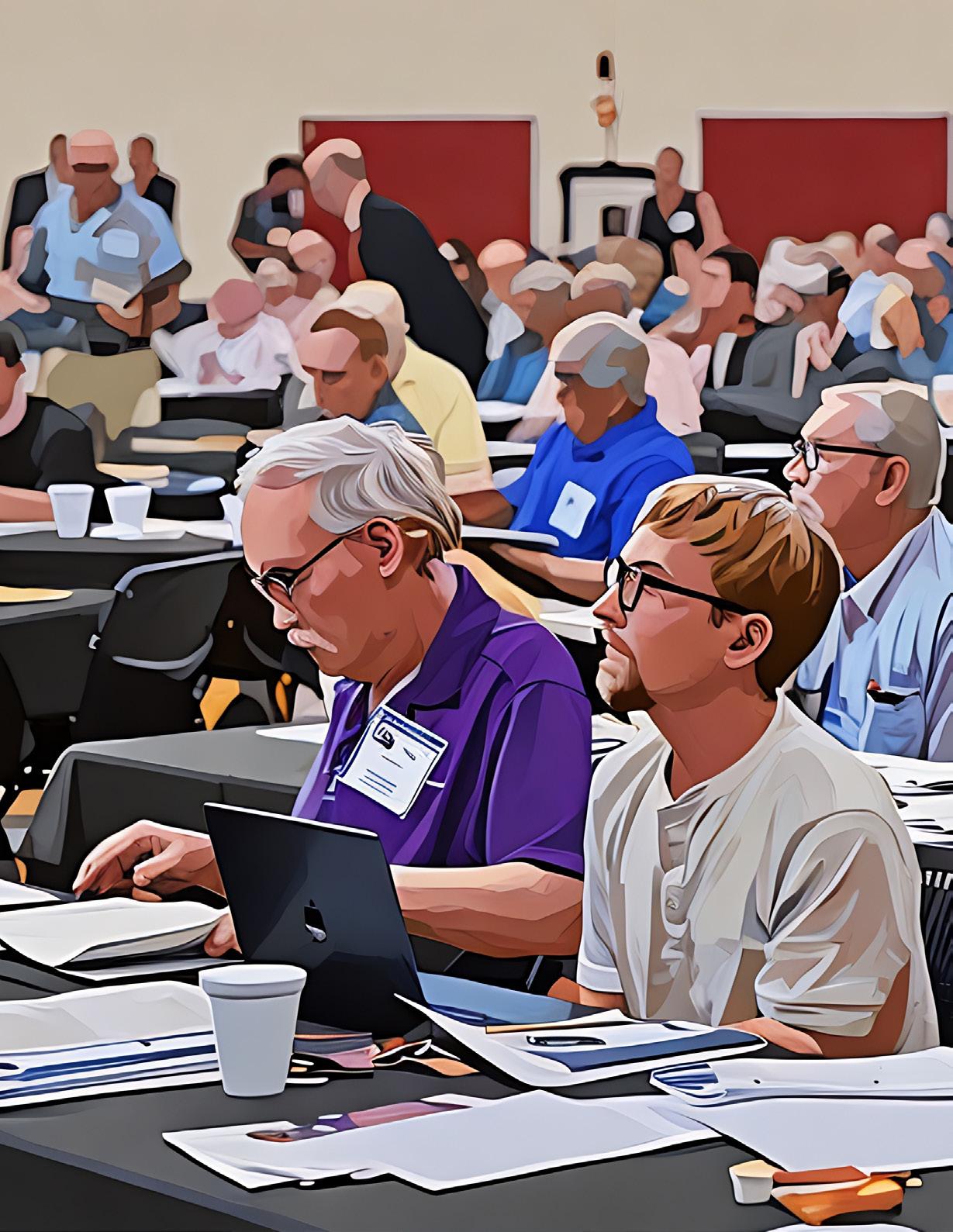


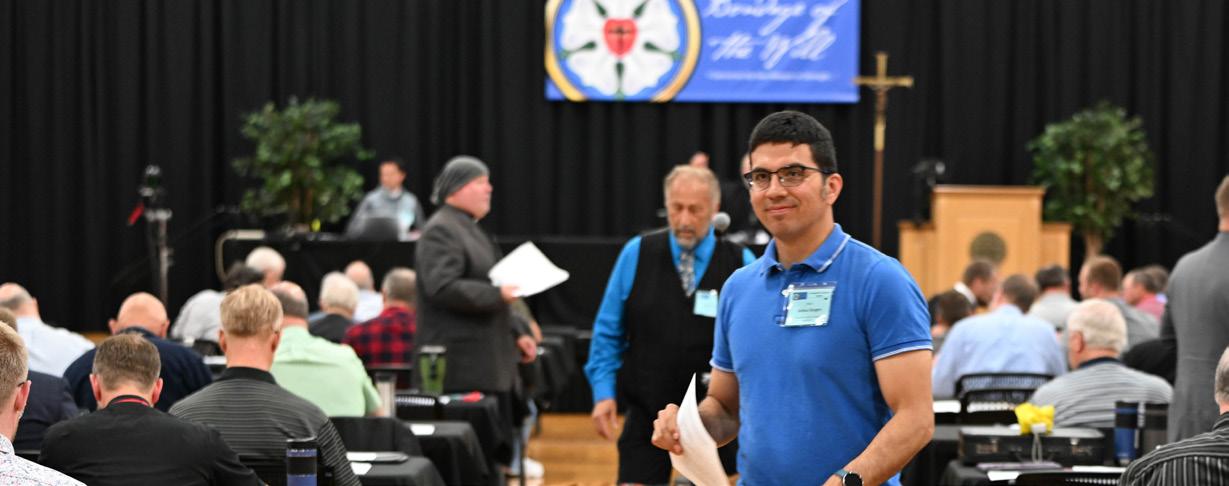
Over the past few decades, the question of having the Evangelical Lutheran Synod meet for convention biennially instead of annually has been raised either through memorials submitted or motions made from the floor. But every time it has been rejected by a significant majority. There certainly is an overall cost (about $39,000 per year) that affects the synod and then each congregation in the form of paying for its pastors’ and delegates’ expenses including registrations and helping with equalizing the cost for travel.
What explains the ongoing desire to meet every year? It might be the trust factor: wanting more frequent oversight from the grassroots of the work by the various boards and committees. But probably even more than that, it has to do with the desire to share in “mutual conversation and consolation of brethren.” This expression is found in one of our Lutheran Confessions: The Smalcald Articles. Luther was thought in 1537 to be approaching an age where his death would take him from the relatively young church body that bore his name. He was then asked to give a last will and testament of his teachings based on Scripture.
So, in Article IV, “The Gospel,” Luther acknowledges that the gospel gives counsel and aid against sin in several divinely appointed ways: the preaching of the forgiveness of sins; holy Baptism; the holy Sacrament of the Altar and the power of the keys. But in addition, he mentions the “mutual conversation and consolation of brethren.” He especially cites two passages: Jesus said: “Where two or three are gathered together in My name, I am there in the midst of them” (Matt 18:20), and St. Paul writing to the Roman Christians: “I long to see you, …that I may be encouraged together with you by the mutual faith both of you and me” (Rom 1:11-12).
Truly this is a benefit for our pastors, teachers, laity (delegates and visitors), and professors alike to find that form of the gospel in our mutual conversations and consolations resumed
every year as we meet. The gospel is at work in our services of Word and Sacrament and reports of work engaged over the past year with our mutual support. Even over shared meals and breaks we converse and console one another less formally, but no less effectively.
Now it has also been posited that perhaps our frequent meetings have also had a negative effect, similar to the expression: “familiarity breeds contempt.” Putting sinners together repeatedly in any setting, we observe our differences. How we seek to discuss and settle those differences can lead to fighting unfairly, e.g., name calling, not listening to the opinions of others respectfully and objectively, making assumptions of ill motive, putting words in the mouths of those with whom we disagree, etc.
Consider these words from the writer of Hebrews: “[L]et us draw near [around the gospel of our Lord where Jesus’ presence is found] with a true heart in full assurance of faith, having our hearts sprinkled from an evil conscience and our bodies washed with pure water. Let us hold fast the confession of our hope without wavering, for He who promised is faithful. And let us consider one another in order to stir up love and good works, not forsaking the assembling of ourselves together, as is the manner of some, but exhorting one another, and so much the more as you see the Day approaching” (10:22-25).
So, regardless of the annual cost and the possible contempt through familiarity, I do not see the ELS changing to biennial conventions any time soon. The gospel exposure through our mutual conversation and consolation will always be difficult for us Christians to dismiss and give up. I hope to hear many of your familiar voices next year in Mankato, the Lord willing!
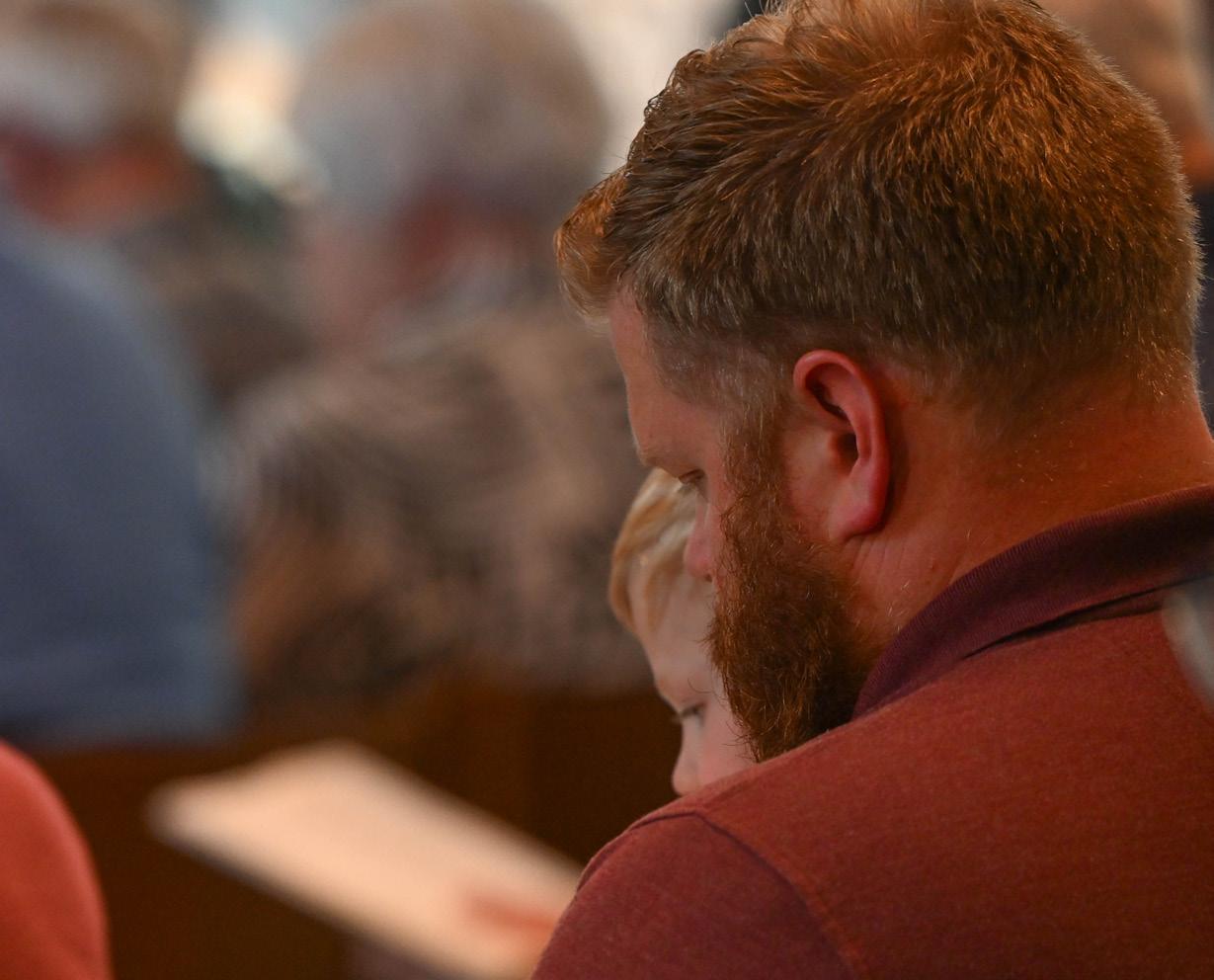

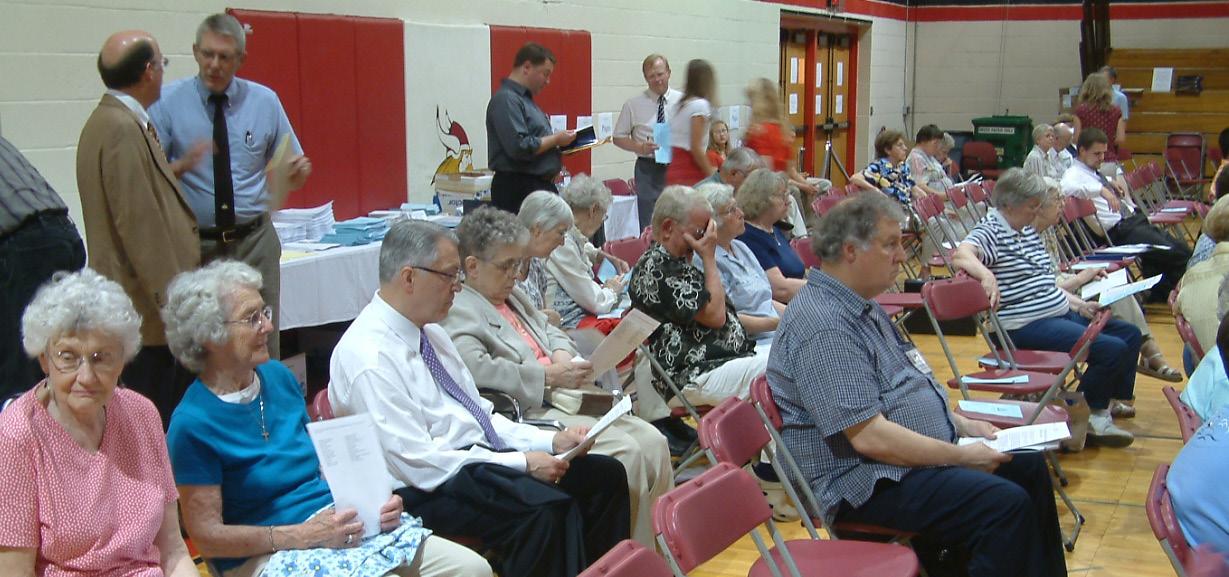
Sunday mornings growing up meant sitting nearly as close to the back of the church as we could. I’m not sure why, and it may seem strange that someone like that would become a pastor who each week stands, sits, and sings in front of everyone else. But that’s how it was. Perhaps it was because we Braun kids could be trusted to be all the way “back there” and not mess around. (Though there was one memorable Sunday in the balcony that involved the mercury from a broken thermometer. Non-toxic fun at its very best!)
That tradition has continued to this day. When in “civilian” mode, I normally prefer the back rows of churches and chapels. There’s a certain nostalgic charm to it as well as a safe and secure feeling that I get but can’t explain. And one might think that my desired seat at something like the synod convention would be something similar, and they’d be right. For most of the past 35 years I’ve sat in the way-back left as you face the stage and, if that gets in any way disrupted, I’m more out of sorts than normal for the whole week.
This is because of, I think, two things. First, I find encouragement in seeing all my brothers and sisters in Christ in front of me. Now, in Mankato and through the years that view has changed as people age and as younger, newer ones take their place. Regardless, it’s the “pre-host arrayed in white” that is Christ’s kingdom on earth that faces away from me and toward the Christ in their midst and with whom I join sometimes in song and always in prayer responding to His Word of forgiveness.
Sitting in back at the convention also affords me an opportunity to watch the delegates and pastors as they do the work they were sent to Mankato to do. Whether it’s the side conversations,
the speakers at the front, those at the microphones down the middle, I enjoy watching how the whole thing works day after day and year after year and witness how much effort goes into the work of the E.L.S. and our Bethany Lutheran College.
The second reason is a bit stranger: I get to “hide” during the singing. Having served three smallish congregations over the years, I’ve had to do much of the “lead” singing during the hymns and liturgy. My voice has had to rise above the rest of the people there to encourage their own song. And so when I go to conventions and conferences, I may be inclined to give my voice a bit of a rest. Therefore, there are many times when I will sit and only listen to what’s being sung.
Why? I like to hear the words and the voices of others intone the mercies of God with and to one another. I sometimes think of it as my own, private concert, sung for my benefit and refreshment. Sort of the very Lutheran “mutual conversation and consolation of the brethren” sort of thing. Also, sitting in the back makes it much easier for me to hide the fact that I’m not joining in with everyone else and can feel a bit less conspicuous.
Now, while that may seem a bit odd – and it probably is – realize that whether in church or convention pretty much everyone has a favorite seat. A preferred side and distance from the front. Their reasons may vary, but the benefits do not. No matter front, middle, back, whether left or right side: joining together in the ways that we of the E.L.S. do, we are abundantly blessed to receive the gifts of God in Christ Jesus and then take those blessings with us as we leave those places in “faith toward Him, and in fervent love toward one another.”
I am discouraged. As a Lutheran layperson, I’ve attended several apologetics workshops and evangelism seminars. I enjoy learning how to share the good news of Jesus with those around me. Yet when I get the opportunity to share my faith one-on-one, my anxiety runs high and I get easily flustered. Often the training I received “goes out the window.” Conversations don’t turn out the way I expected, or the gospel seems to have no impact.
In the face of failure, where do Christians find encouragement and motivation to continue working at sharing the gospel?
Many Christians find one-on-one evangelism discouraging because the task involves learning to deal with failure. Human beings naturally see failure as something to avoid. Yet we fail at the task of evangelism—a lot. Even when we bear faithful witness, many still reject Christ and the truth of His Word. Yet over time, the humiliation and shame of repeated failure and rejection can wear down even the most faithful evangelist. God’s people find encouragement and motivation for sharing the gospel by looking outside of themselves to the very gospel they share.
In the gospel, we discover a Savior who willingly embraced the “failure” of the cross in order to save us. During the days of the Roman Empire, a person had to have failed at life in the worst way to end up nailed to a cross to die. Who would willingly volunteer for that kind of shame and humiliation? Jesus Christ did! He “humbled himself by becoming obedient to the point of death, even death on a cross” (Phil 2:8). Christ Jesus loved us so much that He did not see suffering as something beneath His status as God. So, in order to save us, He put our needs first and willingly suffered the shame and humiliation of the cross in our place. He bore the guilt of our sins and failures even though He Himself was without sin.
The gospel gives us a new perspective on our place in God’s kingdom. Through His Son’s death and resurrection, the Father now claims us as His redeemed and restored children, having called us out of the darkness of unbelief into the marvelous light of His grace and truth in Christ. Through faith in Christ, we are “a royal priesthood,” called to “proclaim the excellencies of Him who called you out of darkness into His marvelous light” (1 Pet 2:9). Having been rescued from sin and death, sharing the good news of Jesus isn’t something we have to do. It’s something we get to do as royal priests in the kingdom of Christ.
God’s Word also encourages us by helping us better understand our role as “royal priests.” Sometimes we think of ourselves as either planting the seed of God’s Word or
watering the seed that’s already planted. Another image comes to mind, however, when we think of the word “priest.” Pontifex, the Latin word for “priest,” actually means “bridge-builder.” As we “proclaim the excellencies” of our Lord, we can see ourselves as simply building bridges that connect God’s powerful, saving Word to the people around us.
Being a bridge-builder has its advantages. While a trained evangelist may have various techniques for sharing the gospel with people, one does not have to have a memorized technique to build a bridge with another person. The start of a bridge might be a simple act of love for someone in need. Conversations can move organically as we find natural places to bring the wonders of God’s grace into focus. Nor does bridge-building depend completely on talking with strangers. Christians may build bridges to God’s Word within the relationships they already have with friends, family, and coworkers.
Most importantly, when we see ourselves as bridge-builders, we can take comfort in the fact that we’re not responsible for getting people “over the bridge.” Instead, we can leave that work for the One who already crossed the divide of sin and death to save us. We can focus on being faithful stewards of the gospel, trusting that the Lord will keep His promise even when our efforts look like failure. His Word shall accomplish His purpose and succeed in the thing for which He sends it (Isaiah 55:11).
Do you have a question for Pastor Van Kampen? ?
Send them via email: Send them via “snail mail”: pvankampen@holycrossmadison.org
Pastor Piet Van Kampen

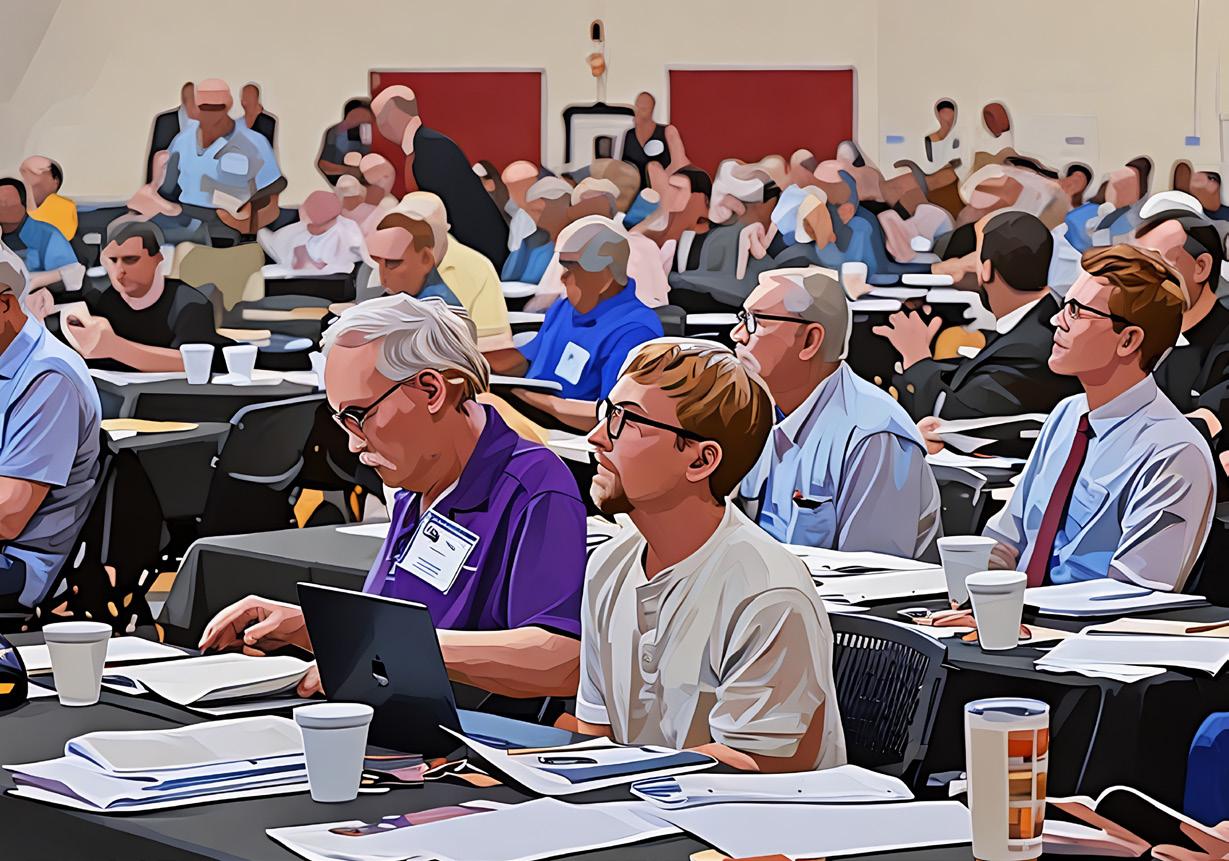
by PASTOR GLENN OBENBERGER President, Evangelical Lutheran Synod
Except for the sad circumstances which caused it, namely the sudden death of Pres. John Arthur Moldstad, it has been my pleasure to serve the ELS in the office as president since January 2021 and preside over our annual conventions. The latter has been a pleasure in the way that many roller-coaster rides I have enjoyed from my youth were. There is always the fearful anticipatory climb to the top, in this case – Father’s Day/Synod Sunday. Then the quick descent after the floor committees offer their resolutions to be considered which provides the up and down thrilling overall experience. So far, I have presided over four of these fraternal gatherings seeking to do joint work in the Kingdom of our Lord. I am writing this article prior to my fifth attempt, so what I am about to describe may totally be undone when it all actually happens.
Work begins at least a year in advance by choosing the theme and essayist(s) for the following year. By January and
February, we have appointed a convention manager from our Bethany Lutheran College who leads us in arranging the particulars, and then preregistration begins. In March, we secure preachers and devotion leaders through the appointed chaplain. We also contact honorees/families for anniversary/memorial observances and invite representatives of other synods. After the program and committees are determined, the Book of Reports and Memorials is printed and distributed in April.
Special events, large and small, also need to be coordinated besides the annual ordination anniversaries and memorial service for pastors and wives. These were some recent convention events overseen and in the planning stages: Bethany Lutheran Theological Seminary 75th Anniversary; dedications of the ELS Military Monument, the Bethany Activity Center, and Processional Crucifix in memory of President John Moldstad which graces the stage at convention and the synod
conference room throughout the year. The last is a constant reminder to us all that our work supports preaching Jesus Christ and Him crucified. Coming up will be recognitions of the 1,700th anniversary of the Nicene Creed, the 250th anniversary of the Declaration of Independence in 2026, and the 100th anniversary of the synod’s college in 2027.
In 2022, the synod acknowledged a document as reflecting the personality of the ELS called The Flavor of the ELS - “Lift Up Your Hearts—Your Sins Are Forgiven.” Point two of five reads:
The ELS has a non-hierarchical form of organization. This flavor tends more toward a grass-roots approach due to the desire to ensure that pastors and congregations are involved in the decision-making process for their synod, and not relying on bureaucratic processes to provide the way. The synod has a long history of desiring knowledgeable and pious laymen and recognizing the autonomy of local congregations. The ELS ministerium desires to demonstrate both a high view of the office of pastor and an unpretentious manner in the care of souls as pastors and members of congregations historically have interacted with each other with gentleness and hospitality.
This comes out in how the convention generally has a 2:1 ratio of laymen to clergy that are invited to represent the various parishes of the ELS.
One of the complaints that I have heard is that things happen at convention rather quickly these days, usually getting done by Wednesday evening, instead of going into Friday as happened some decades ago. I can relate. As chair I have noticed after the electronic voting for boards and committees, my head often feels like it is still spinning well after the proceedings are over. However, there has been an attempt to slow that process down at least a little bit.
But it has been my observation that the complaint that we could use another day or two for convention is usually voiced by those living the closest to Mankato. Delegates, especially those young men who need to take vacation time for travel to attend, appreciate keeping things on time and accomplished efficiently. While we do not want to stifle healthy discussion among the pastors and delegates, we also seek to keep discussion germane to the matter at hand and follow the agenda agreed upon in a timely manner.
Robert’s Rules of Order is followed to allow for a fraternal, gentlemanly conducting of business. While over the years, when there are major controversial issues before the assembly, this kind of decorum is challenged, we generally get back to a more calm and reasonable approach. In those potential emotionally charged discussions, it is the job of the chair to remind the speakers to address their comments through the chair, lest they turn to a previous speaker in opposition and make it personal, with name calling or even calling motives into question. The assembly needs to be reminded that while they can have healthy debate with opposing opinions expressed, we are
united even in our differing opinions against the real enemy of Christ’s Church, namely Satan and his allies.
We normally appoint two parliamentarians to help adjudicate competing motions, points of order, etc. The chairman appreciates such objectivity to bring clarity to any heated debate so that no one feels as though his voice is being stifled. Having observed some volatile church conventions outside our fellowship, parliamentary procedures can be weaponized to seek the unfair advantage of one side over the other. This can be most unseemly among Christian brothers.
However, I can say over the 40+ years of attending ELS conventions, this has not been witnessed by me to any large extent. There can be what are at times called “unwritten rules” by which we abide through gentlemanly agreement, and some have even been written down at the beginning of the annual Book of Reports and Memorial, e.g., when calling the question to stop debate can be exercised. At times the chair will need to rule certain debate out of order because of it not being germane to the question on the floor or being dilatory in nature, but such rulings can always be challenged for the assembly to judge before proceeding.
Humor, especially self-deprecating humor, is a good ingredient for this annual gathering. Sprinkled in the mix are the nostalgic Moldstadian punster remarks made periodically at the microphones which bring both smiles and the appropriate groans. We in the ELS are certainly serious in our worship and the decisions we make to do the work of Christ’s Church while it is day before the night comes when no one can work. Yet, taking ourselves too seriously, so that we cannot enjoy one another in this fraternal setting, would not be in keeping with a style common among Lutherans going back centuries. Dr. Luther himself showed such comedic relief in his recorded comments and writings. Perhaps humor should be inserted as point #6 in the ELS Flavor document.
One positive comment I hear consistently, especially from delegates and visitors, is in regard to the robust singing at our services and devotions. It is inspiring certainly to hear, but also to join in with our own voices as we sing praises to our Holy God who created, redeemed, and sanctified us. Included with that compliment is how we also have our worship enhanced throughout the convention by the young voices of the Youth Honor Choir. After the COVID epidemic interrupted this tradition for a couple years, it was especially appreciated when it was revived as part of our annual traditional gathering in Jesus’ name.
The fact that we have many of the same lay delegates that return almost on an annual basis would indicate that this event is a highlight for many of our ELS parishes. The only downside to that observation is that more of our laymen and spouses do not get to enjoy this blessed camaraderie in Jesus’ name. God preserve us from taking this blessing from the Lord for granted lest we lose it for the generations to come.

The theme for this issue: “_______Convention”

Synod Convention
Lutheran College Mankato, Minnesota of Convention

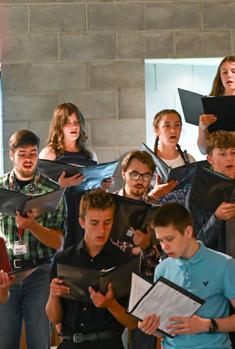

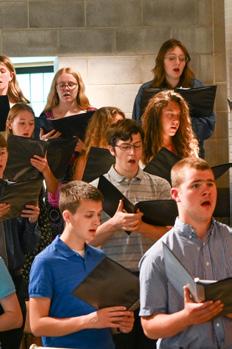
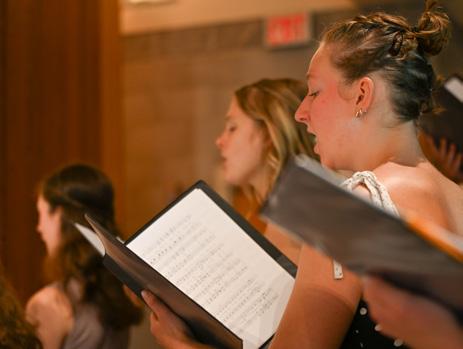
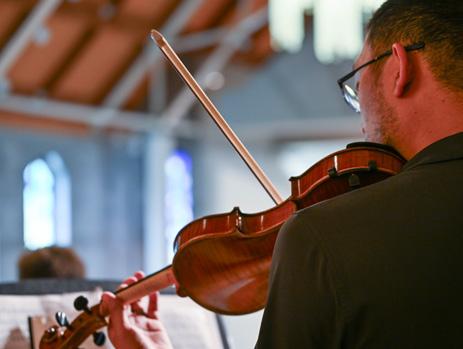
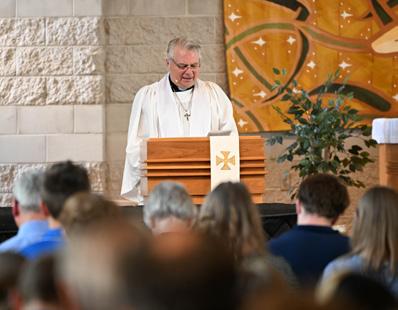

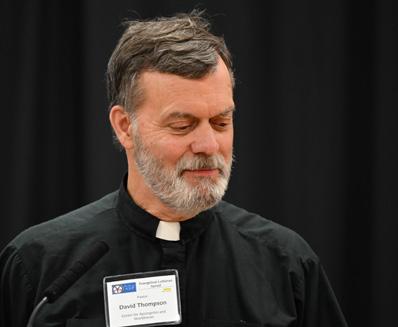

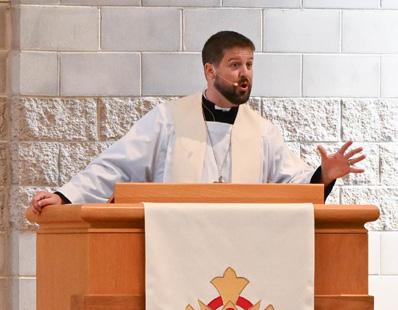
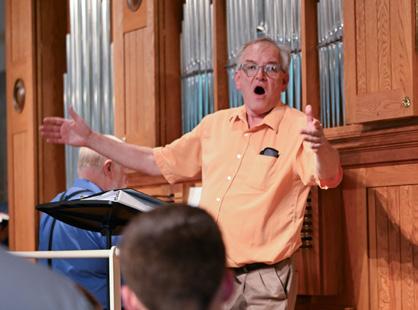
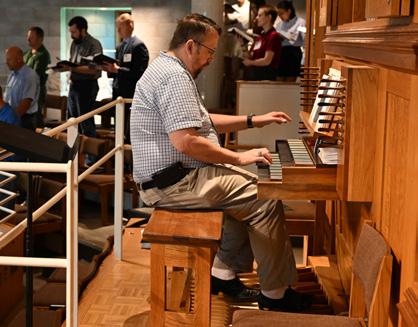
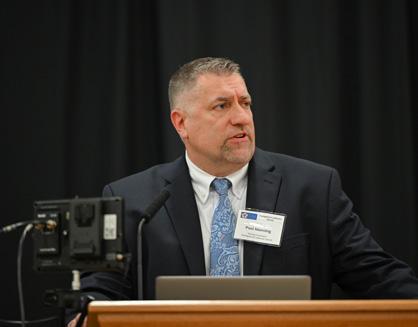

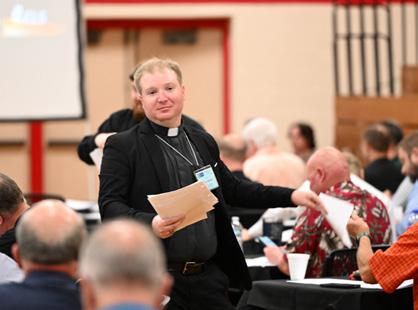

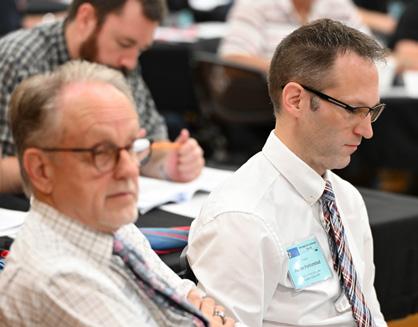
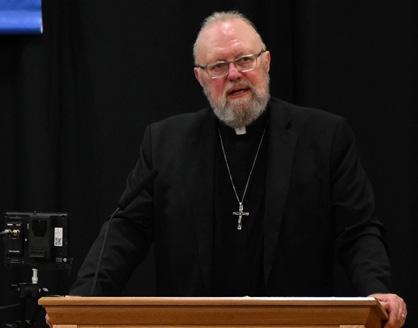

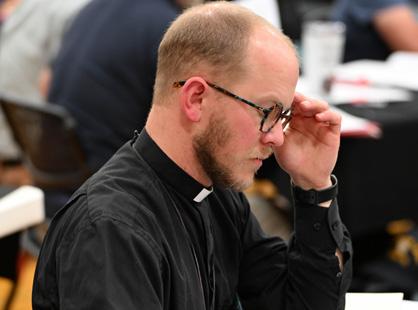


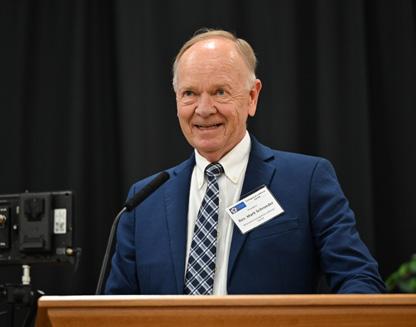
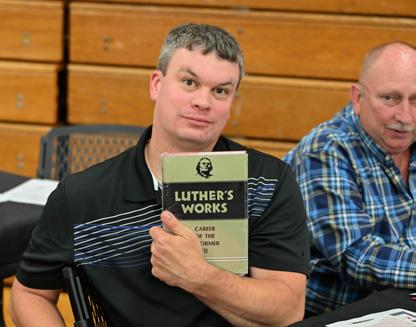

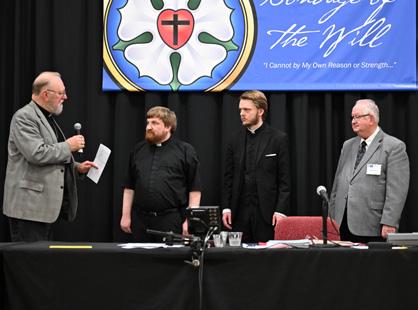
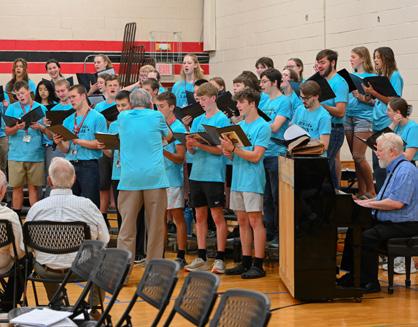

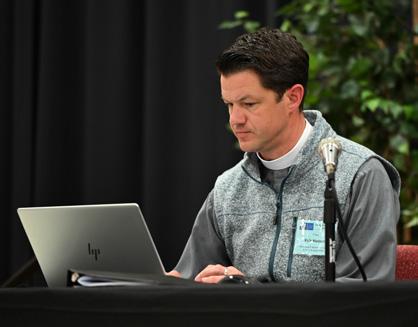
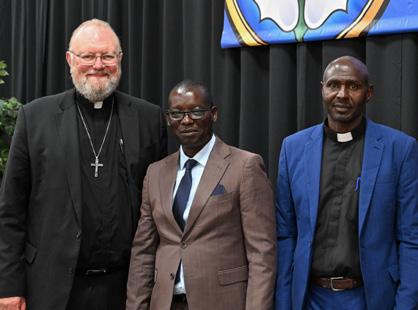
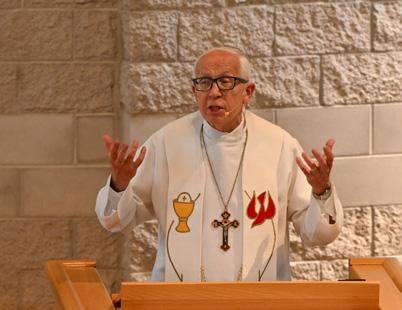
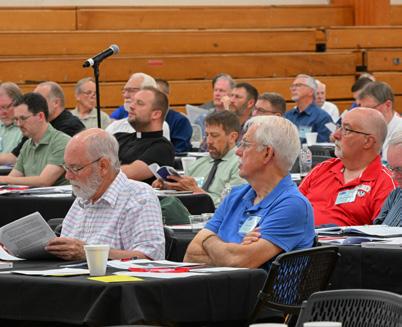


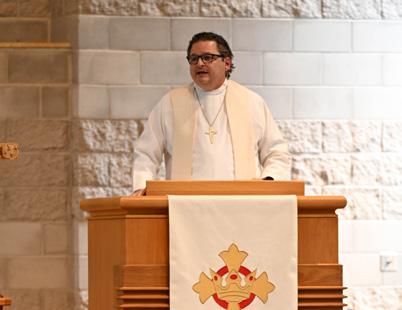

by PASTOR DAVID JAY WEBBER
Delivered at the Annual Convention of the Evangelical Lutheran Synod Mankato, Minnesota, June 17-18, 2025
Is an unregenerated person able to choose to follow God and to believe in Him so as to bring about or to complete –by this choice – his own conversion to faith in God? Can a person who is not yet a believing Christian make a choice to become a believing Christian when he is exposed to God’s Word? Or is an unbeliever incapable of making himself into a believing Christian by the use of his own will – due to his inherited spiritual deadness, and due to his inborn hostility to God – so that his conversion, if he is in fact converted, is completely a work of God within him?
This fundamental question became a public dispute through a written exchange between the highly respected scholar Erasmus of Rotterdam and Martin Luther 500 years ago in 1524 and 1525. Previously, in 1520, Luther had written a treatise in which he asserted that conversion is exclusively an act of divine grace without human cooperation. In 1524 Erasmus responded to this earlier treatise and criticized it in his diatribe “On the Freedom of the Will.” Luther then replied to the diatribe with his treatise “On the Bondage of the Will,” in which he defended and elaborated upon his previous writing and in which he rejected Erasmus’s teaching that the unregenerated human will, even after the fall into sin, still retains the ability to respond positively to God, and to choose either to believe in God or to reject God.
Luther’s dispute with Rome had been dealing with various issues, but he complemented Erasmus that he had identified and addressed the true, fundamental issue, that lay beneath all the others:
...I praise and commend you highly...that unlike all the rest you alone have attacked the real issue, the essence of the matter in dispute, and have not wearied me with irrelevancies about the papacy, purgatory, indulgences, and such like trifles (for trifles they are rather than basic issues), with which almost everyone hitherto has gone hunting for me without success. You and you alone have seen the question on which everything hinges, and have aimed at the vital spot; for which I sincerely thank you... (LW 33:294)
And Luther considered his 1525 treatise to be one of only two (or three) works of his that he thought would have an enduring value for the church even beyond his lifetime. In a 1537 letter Luther indicated that he would not mind if most of his writings would be “devoured” and forgotten. “For I acknowledge none of them to be really a book of mine, except perhaps the one On the Bound Will and the Catechism” (LW 50:172). Luther here is probably considering his Small and Large Catechisms together. And it is, of course, in his Small Catechism where Luther puts the main point of the larger treatise into a form easily accessible to all Christians, when he says:
I believe that I cannot by my own reason or strength believe in Jesus Christ, my Lord, or come to Him; but the Holy Ghost has called me by the Gospel, enlightened me with His gifts, sanctified and kept me in the true faith; just as He calls, gathers, enlightens and sanctifies the whole Christian Church on earth and keeps it with Jesus Christ in the one true faith.
Erasmus had questioned whether it was really possible to
have a definite dogmatic conviction, based on Scripture alone, concerning the depth of human sin, the limitations of the unregenerated human will, and the means and method of conversion and faith, since (in his perception) Scripture seems not to be fully clear and consistent in what it teaches about these things. So, according to Erasmus, we must in the end rely on the church and its tradition in order to resolve these questions. Erasmus also suggested that many aspects of this debate actually lie in the area of open questions that cannot be dogmatically settled, and he proposed a mediating and open-minded approach as the most prudent course for all concerned to take.
To Erasmus, Christianity was in large measure a philosophy of life characterized by a devout desire to follow the example of Christ in how one lived so that precision in doctrine was not that important. Luther, however, was coming from a different direction and with a different set of concerns. He wanted to know where he stood with God. He wanted to know how he as a sinner could be certain that God forgives him, so that he will not be damned as his conscience told him he deserved.
To Luther, God is speaking in the Scriptures, and he wants to be understood. Scripture does not answer every question that humans might ask about every divine mystery. But what Scripture does say can be believed with certainty as God’s incontrovertible truth. As far as human logic is concerned, Scripture does leave some loose ends. But we should not fill in the gaps – where God has remained silent – with human speculation. We should instead focus the attention of our faith where God has not remained silent.
Luther lays out some general principles of Biblical interpretation that have remained as hermeneutical guidelines for us, involving a belief in the fundamental clarity of Scripture and a methodology of allowing unclear passages to be interpreted in the light of clear passages that address the same subject. The central thrust and content of Scripture is Christ: His divine person, His incarnation and perfect human life, His atoning sacrifice and glorious resurrection, and the coming of His eternal kingdom. Much that might previously have been unclear in the Old Testament became clear when Christ appeared as the fulfillment of God’s messianic promises.
There may still be some passages of Scripture that are unclear to us. But those relatively few passages do not affect the overwhelming clarity of Scripture’s central proclamation of Christ and His salvation. Luther admits that
there are many texts in the Scriptures that are obscure and abstruse...because of our ignorance of their vocabulary and grammar; but these texts in no way hinder a knowledge of all the subject matter of Scripture. For what still sublimer thing can remain hidden in the Scriptures, now that...the supreme mystery [has been] brought to light, namely, that Christ the Son of God
has been made man, that God is three and one, that Christ has suffered for us and is to reign eternally? ... Take Christ out of the Scriptures, and what will you find left in them?
The subject matter of the Scriptures, therefore, is all quite accessible, even though some texts are still obscure owing to our ignorance of their terms. ... If the words are obscure in one place, yet they are plain in another; and it is one and the same theme, published quite openly to the whole world, which in the Scriptures is sometimes expressed in plain words, and sometimes lies as yet hidden in obscure words. (LW 33:25-26)
There has always been a lot of interest in Luther’s treatise “On the Bondage of the Will” beyond the Lutheran Church. Calvinists have been known to say that this treatise shows that Luther was actually a “Calvinist” who believed in and taught a doctrine of double predestination, just as John Calvin did.
Luther had written his 1525 treatise before the emergence of John Calvin as an influential theologian. Because Luther was writing at an earlier time, a small number of his statements may not have been formulated as carefully as they likely would have been once Calvin’s teaching on double predestination emerged. Calvinists, however, interpret those few ambiguous statements in Luther’s 1525 treatise through the lens of Calvin’s later teaching, and by way of inference and extrapolation claim that Luther also taught that God from eternity willed the salvation of the elect, and predestined them to heaven; while God from eternity willed the damnation of the reprobate, and predestined them to hell: so that the eternal fates of both categories of men were predetermined absolutely by the infinite plan and will of God.
Calvinists see Luther as their ally and a theological compatriot of Arminian “decision theology” that are popular today –in Luther’s statement “that God foreknows and predestines all things, that He can neither be mistaken in His foreknowledge nor hindered in His predestination, and that nothing takes place but as He wills it (as reason itself is forced to admit),” so that “on the testimony of reason itself there cannot be any free choice in man or angel or any creature” (LW 33:293). The trajectories of human logic and reason would indeed take us to the conclusion that if God wills the salvation of the elect, and if only the elect will be saved, then God must will the damnation of the damned. God not making a decision to save the damned is logically the same as God making a decision not to save them, which in turn is logically the same as God making a decision to damn them. That logic would seem to hold, when all these dots are connected.
But God’s revealed Word, and what God impresses upon us for us to believe, do not go where the trajectories of human reason would go. And Luther does not go there, either. Because God has not revealed such a sequence of deductions to us, we do not believe in this or confess this. As far as the unfathomable mysteries of God’s eternal thoughts and plans
are concerned, Luther confesses instead that
God must therefore be left to Himself in His own majesty, for in this regard we have nothing to do with Him, nor has He willed that we should have anything to do with Him. But we have something to do with Him insofar as He is clothed and set forth in His Word, through which He offers Himself to us... (LW 33:139)
And as Luther goes on to explain, what “God as He is preached is concerned with” is “that sin and death should be taken away and we should be saved. For ‘He sent his word and healed them’ [Ps. 107:20]” (LW 33:140). Luther criticizes Erasmus, however, because his diatribe does not make
any distinction between God preached and God hidden, that is, between the Word of God and God himself. God does many things that He does not disclose to us in His word; He also wills many things which He does not disclose Himself as willing in His word. (LW 33:140)
God’s hidden will is inscrutable. That is, it is impossible to understand or interpret. We know that He has an inscrutable will, but we have no access to it. We cannot construct a theology on the basis of it, or predict what will happen in our own lives or in human history because of it. What resides in that hidden will is, quite simply, not our business. But, as Luther explains,
It is our business...to pay attention to the word and leave that inscrutable will alone, for we must be guided by the word and not by that inscrutable will. After all, who can direct himself by a will completely inscrutable and unknowable? It is enough to know simply that there is a certain inscrutable will in God, and as to what, why, and how far it wills, that is something we have no right whatever to inquire into, hanker after, care about, or meddle with, but only to fear and adore. (LW 33:140)
If we would allow our human reason to make what seem to be logically necessary deductions about God’s infinite knowledge, almighty power, and absolute control over all things, we would end up in a state of fear and despair. But this God of deep mystery and great majesty is not the God with whom we, as fallen and needy sinners, must interact. Instead, God cloaks this mystery and majesty under His Word: as He comes to us, and makes Himself accessible to us, in a powerful yet simple message of salvation and spiritual healing. The glory with which He wraps himself, as He makes himself known in his Word of promise and hope, is not the unsettling glory of His unlimited sovereignty, but is the soothing glory of His unlimited love.
Another aspect of this mystery is that Christ wills the gospel and “Christian doctrine...to be proclaimed and to reign throughout the world...” Luther also notes:
“The word of God is not bound,” says Paul [II Tim. 2:9]... God has not given us a Word that shows partiality in respect of persons, places, or times; for Christ says: “Go into all the world” [Mark 16:15]. He does not say, “Go to one place and not another”... And He says, “Preach the gospel to every creature” [ibid.], not “to some and not to others.” (LW 33:57)
Speculations about God’s possible hidden thoughts and desires could be a source of confusion and doubt for someone with a guilty conscience who wonders if God actually wants him to hear and believe the gospel. But listening to what God actually says in Scripture dissipates any such confusion and doubt.
Where Calvin later taught that God sends and leads the elect to heaven, and that God also sends and leads the reprobate to hell, Luther in 1525 had set forth a very different contrast. He compared the way in which God’s grace shapes and directs the will of believers, with the way in which Satan shapes and directs the will of unbelievers. Luther describes the orientation of the human will with the use of imagery picturing God and Satan as riders on a donkey:
...the human will is placed between the two like a beast of burden. If God rides it, it wills and goes where God wills, as the psalm says: “I am become as a beast [before thee] and I am always with thee” [Ps. 73:22 f.]. If Satan rides it, it wills and goes where Satan wills; nor can it choose to run to either of the two riders or to seek him out, but the riders themselves contend for the possession and control of it. (LW 33:66)
The main focus and ultimate point of his treatise was always to underscore the revealed biblical truth that the saved are saved by God’s grace alone, according to God’s eternal gracious plan for them. The fate of the damned is not discussed in the same way, and is not attributed to God in the same way.
Erasmus had warned against Christian theologians being too assertive in their statements about God and his truth. Luther in particular was criticized by Erasmus for his “obstinate assertiveness,” in his declarations concerning salvation by God’s grace alone without a human contribution. Luther responded that
it is not the mark of a Christian mind to take no delight in assertions; on the contrary, a man must delight in assertions or he will be no Christian. And by assertion... I mean a constant adhering, affirming, confessing, maintaining, and an invincible persevering... (LW 33:19-20)
Such boldness and confidence would not be fitting when discussing things that God has not clearly revealed. But where God has spoken clearly and directly, so must we as we confess the truth of what God says. This is not a time for academic gentility and reserve. And so Luther says:
Let Skeptics and Academics keep well away from us Christians... ...Christ says: “Everyone who confesses me before men, I also will confess before my Father” [Matt. 10:32]. Peter bids us give a reason for the hope that is in us [I Peter 3:15]. ... Nothing is better known or more common among Christians than assertion. Take away assertions and you take away Christianity. (LW 33:20-21)
Luther also points out the practical and spiritual dangers of Erasmus’s attitude, for the consciences of Christians who need to know what is true. Assertions of God’s truth are not only permissible, but are necessary. And so Luther rebukes and corrects Erasmus:
In short, what you say here seems to mean that it does not matter to you what anyone believes anywhere, so long as the peace of the world is undisturbed, and that in case of danger to life, reputation, property, and goodwill, it is permissible to act like the fellow who said, “Say they yea, yea say I; say they nay, nay say I,” and to regard Christian dogmas as no better than philosophical and human opinions, about which it is quite stupid to wrangle, contend, and assert, since nothing comes of that but strife and the disturbance of outward peace. (LW 33:23)
There are times when the truth is more important than outward peace. Those who speak and preach on God’s behalf often need to say things that correct error, and that make people feel uncomfortable. But those who speak and preach on God’s behalf also need to say things that people who are frightened and confused need to hear for their comfort, and that God wants them to hear clearly and powerfully: regarding his grace toward then in Christ, and regarding his unswerving love for them in spite of their weakness.
Luther unfolds the deeper mystery of God’s absolute sovereignty over all things, to the extent that this is revealed to us in Scripture. As a fundamental principle of God’s existence as God, his will and actions are not qualified by contingency – by which a future event or circumstance is understood to be possible, but cannot be predicted with certainty, because something else may happen which would prevent it from occurring. And God’s will and actions are also not qualified by mutability – according to which God’s eternal plans might be altered, and he might change his mind with respect to a promise or pledge that he has made.
Everything that will happen, God has always known will happen. Nothing will ever surprise him. God will never need a “Plan B” or an unanticipated “workaround” for what he wishes to accomplish according to his eternal and unchanging will. But this basic principle of what divinity means, is not contemplated by Luther for its own sake, but is set forth for the sake of a Christian’s certainty that God’s gracious plans and promises for his salvation cannot be thwarted. And so Luther says to Erasmus:
For if you doubt or disdain to know that God foreknows all things, not contingently, but necessarily and immutably, how can you believe his promises and place a sure trust and reliance on
them? For when he promises anything, you ought to be certain that he knows and is able and willing to perform what he promises; otherwise, you will regard him as neither truthful nor faithful, and that is impiety and a denial of the Most High God. ...Paul says in Romans 3[:4]: “Let God be true though every man be false,” and again [Rom. 9:6]: “Not as though the word of God had failed,” and elsewhere: “But God’s firm foundation stands, bearing this seal: ‘The Lord knows those who are his’” [II Tim. 2:19]. (LW 33:42)
Luther is very serious about the importance of a proper teaching about God’s sovereignty and control over all things – for the sake of the reliability of the gospel – so that he even says that
Christian faith is entirely extinguished, the promises of God and the whole gospel are completely destroyed, if we teach and believe that it is not for us to know the necessary foreknowledge of God and the necessity of the things that are to come to pass. For this is the one supreme consolation of Christians in all adversities, to know that God does not lie, but does all things immutably, and that his will can neither be resisted nor changed nor hindered. (LW 33:43)
Luther does make an important distinction between necessity and compulsion. As the mystery of God’s immutable knowledge and will is worked out around us and within us, we do not feel as if something is being forced upon us. An unbeliever’s bad choices – in favor of Satan’s will and against God’s will – are, for him, natural choices, and are experienced by him to be free choices. He really wants to sin and to worship idols. And one who has been converted and regenerated by God, and whose will has been liberated and enlivened by God’s Spirit, believes in God and desires to serve and obey him, also with a feeling of complete freedom in that faith and in that desire. According to the new nature of a Christian, there is no sense of being forced to faith and obedience. And so Luther explains:
Now, by “necessarily” I do not mean “compulsorily”... ...when a man is without the Spirit of God he does not do evil against his will, as if he were taken by the scruff of the neck and forced to it, like a thief or robber carried off against his will to punishment, but he does it of his own accord and with a ready will. ... By contrast, if God works in us, the will is changed, and being gently breathed upon by the Spirit of God, it again wills and acts from pure willingness and inclination and of its own accord, not from compulsion... So not even here is there any free choice, or freedom to turn oneself in another direction or will something different, so long as the Spirit and grace of God remain in a man.
(LW 33:64-65)
A systemic flaw that Luther sees throughout Erasmus’ diatribe (described by him in feminine terms) is its failure to distinguish between law and gospel:
Diatribe makes no distinction whatever between expressions of the law and of the gospel; for she is so blind and ignorant that she does not know what law and gospel are. (LW 33:132)
Indeed, we cannot understand anything that Luther is saying in his treatise – by which he is responding to the diatribe –unless we also understand this distinction.
Law and gospel are, as it were, God’s “language” of self-revelation. Everything that God impresses upon us through the Scriptures is either a message of mandates and judgments or is a message of regeneration and forgiveness. And for as long as this world endures, before the Last Day, a defining purpose of the law’s judgments will be to drive humanity to repentance so that faith can be kindled or renewed by the grace of the gospel that always follows. In the church, the law always serves and prepares the way for the gospel; which delivers us from the evil that threatens us, from the blindness that captivates us, from the condemnation that hangs over us, and from the death that ultimately claims us. Luther writes, then, that
Scripture...represents man as one who is not only bound, wretched, captive, sick, and dead, but in addition to his other miseries is afflicted, through the agency of Satan his prince, with this misery of blindness, so that he believes himself to be free, happy, unfettered, able, well, and alive. ... Accordingly, it is Satan’s work to prevent men from recognizing their plight... But the work of...a lawgiver is the opposite of this, namely, to make man’s plight plain to him by means of the law..., so as to prepare him for grace and send him to Christ that he may be saved. (LW 33:130-31)
Regarding this purpose of the law, Luther holds that God’s commandments in Scripture do not presuppose or indicate that human nature as it now exists – since the fall – is able to obey those commandments. Rather, the law reveals sin in preparation for the saving grace of the gospel:
...just as the voice of the law is not raised except over those who do not feel or acknowledge their sin, as Paul says in Romans 3[:20]: “Through the law comes knowledge of sin,” so the word of grace does not come except to those who feel their sin and are troubled and tempted to despair. Thus in all expressions of the law you see that sin is revealed, inasmuch as we are shown what we ought to do... ...in the words “Love God with all your heart,” we are shown the good we ought to do, ...in order that we may recognize how unable we are to do that good. (LW 33:13738)
Speculations about God’s hardening and damning will – over against those who never do repent, and who are therefore without hope – are not a component of the law that is to be proclaimed because such speculations would not fulfill the law’s purpose of convicting and driving to repentance. The law-gospel message that the church proclaims is always an inviting message of “repentance for the forgiveness of sins” (Luke 24:47, ESV) addressed to all and is not sometimes a dead-end message of hopeless and inescapable perdition which would lead only to despair and not to repentance.
According to God’s hidden, inscrutable, and unrevealed will,
the conclusion might even be reached that some of God’s works are evil works – when unbelievers are hardened in their unbelief or when the wicked are given over completely to their wickedness. But if it be “asked how God can be said to work evils in us, such as hardening, giving men up to their lusts [Rom. 1:24], leading them astray, and so forth,” we ought “to be content with the words of God, and believe quite simply what they say, since the works of God are entirely beyond description” (LW 33:175). Reason by necessity will conclude that an omniscient and omnipotent God, outside of and beyond his Word, wills the death of a sinner “according to that inscrutable will of his,” since unrepentant sinners do die both temporally and eternally. But faith nevertheless knows instead that “he does not will the death of a sinner, according to his word” (LW 33:140).
Erasmus confuses law and gospel by treating many gospel passages of Scripture as if they were law passages. When God in Scripture offers and bestows grace and forgiveness, to be received through a divinely wrought faith, Erasmus turns those divine gift passages into divine demand passages that command faith, through an exercise of free will, as a condition to be met by human effort before a divine blessing can be had. But since “it is God who works in you, both to will and to work for his good pleasure” (Philippians 2:13, ESV), the human will that God’s promises engage and address is a will that is regenerated and liberated by the Holy Spirit through the very promises that are offered to it. And so Luther seriously asks:
...what good will anyone do in a matter of theology or Holy Writ, who has not yet got as far as knowing what the law and what the gospel is, or if he knows, disdains to observe the distinction between them? Such a person is bound to confound everything – heaven and hell, life and death – and he will take no pains to know anything at all about Christ. (LW 33:132)
Such admonitions and warnings are needed today as well. The “decision theology” that is so often preached today among the evangelical Protestants who surround us demands faith as a human act of the unregenerated will and as a condition for being saved and “born again.” But proper Christian preaching, after it brings a sinner to conviction through the law, creates and bestows faith by announcing to the penitent the forgiveness, life, and salvation that Christ has won for the world.
The very concept of regeneration has been hijacked by decision theology and has been turned into something that is unrecognizable when compared to what the Bible teaches about the new birth of the Spirit. Jesus uses the imagery of generation and birth to describe the beginning of a new spiritual life precisely because he wants us to understand that those who are “born again” are “born of water and the Spirit” (John 3:3-4, ESV), and not of water, the Spirit, and a decision of the human will as the capstone and culmination of conversion. Believers receive spiritual life as a pure gift
from God – just as all human beings are generated from their human parents and receive their human life as a free gift from them through the procreative process that God established for humanity.
We do not help to bring ourselves into existence as children of our earthly parents or to place ourselves into the womb of our mother. This is not something that we do. It is something that is done to us. So too we do not help to bring ourselves into existence as children of our heavenly Father or to place ourselves into the spiritual fellowship and womb of the church. This is something that God does for us and in us and that is received by faith in his baptismal promises.
But also, as far as the source and origin of that faith are concerned, it “is the work of God, that you believe in him whom he has sent” (John 6:29, ESV). Holy Baptism – to which the regenerating power of God’s Trinitarian Word is particularly (though not exclusively) attached is a gospel-gift of God which creates the very faith that it calls for. The New Testament everywhere describes it in such terms. Baptism is not an empty, external ritual of the law demanded by God as an act of human obedience.
What Luther criticizes in Erasmus’ teaching is the notion that an unregenerated person has the capacity to make an unfettered free choice in response to God’s overtures or directives, either to follow and obey God or to reject and turn away from God. Luther clarifies that
We are not discussing what we can do through God’s working, but what we can do of ourselves; that is to say, whether, created as we are out of nothing, we do or attempt to do anything under the general motion of omnipotence to prepare ourselves for the new creation of the Spirit. (LW 33:242)
The answer Luther gives to this question is twofold. First, he points out that
Before man is created and is a man, he neither does nor attempts to do anything toward becoming a creature, and after he is created he neither does nor attempts to do anything toward remaining a creature, but both of these things are done by the sole will of the omnipotent power and goodness of God, who creates and preserves us without our help; but he does not work in us without us, because it is for this he has created and preserved us, that he might work in us and we might cooperate with him, whether outside his Kingdom through his general omnipotence, or inside his Kingdom by the special virtue of his Spirit. (LW 33:242-43)
As sinful and corrupt creatures of God we are nevertheless tools and instruments in God’s hands in spite of ourselves. God operates in and through us as we live and act in this world and as we make decisions even without any conscious awareness of how divine providence or divine justice may be working themselves out by means of actions and
decisions that God is invisibly shaping and directing for his inscrutable purposes. And second, Luther points out that
before man is changed into a new creature of the Kingdom of the Spirit, he does nothing and attempts nothing to prepare himself for this renewal and this Kingdom, and when he has been recreated he does nothing and attempts nothing toward remaining in this Kingdom, but the Spirit alone does both of these things in us, recreating us without us and preserving us without our help in our recreated state, as also James says: “Of his own will he brought us forth by the word of his power, that we might be a beginning of his creature” [James 1:18] – speaking of the renewed creature. But he does not work without us, because it is for this very thing he has recreated and preserves us, that he might work in us and we might cooperate with him. Thus it is through us he preaches, shows mercy to the poor, comforts the afflicted. (LW 33:243)
When I have been made by the Spirit’s working to be a new creature in Christ, I am able to know from Scripture that this was and is completely a gift of divine grace. God descended upon me from the outside, changed and recreated me, converted me, and put his Spirit within me. And even now, he alone graciously preserves this new life of faith within me: transforming my mind, enlivening my heart, and redirecting my will.
Luther draws attention to what St. Paul’s Epistle to the Romans teaches about the depravity of fallen human nature when he writes that
In the third chapter...he says: “What then? Are we better off than they? Not at all. For we have argued that Jews and Greeks are all under sin” [Rom. 3:9].
Luther then asks:
Where is free choice now? All, he says, all Jews and Greeks are under sin. ... When he...declares that they are under sin, or in other words, are slaves of sin, he leaves nothing of good in them. But where has he stated this case, that Jews and Gentiles are all under sin? ...where he says: “The wrath of God is revealed from heaven against all ungodliness and wickedness of men” [Rom. 1:18]. ...in God’s displeasure they have been given up to so many vices, as though these fruits of their own ungodliness convict them of willing and doing nothing but evil. (LW 33:252)
And Luther warns that “the wrath that is revealed from heaven against them is going to damn their whole being, unless they are justified through the Spirit...” (LW 33:253).
Luther also draws attention to St. Paul’s use of the Old Testament to bolster his argument, when “Paul proves his point from Holy Writ”:
“As it is written,” he says, “‘None is righteous, no, not one, no one understands, no one seeks for God. All have turned aside, together they have become worthless’; no one does good, not
even one,” and so forth [Rom. 3:10 ff.]. ... It is certain that these things are said of all men, for the prophet [David] represents God as looking down on all men and passing this judgment on them. For so it says in Psalm...[14:2 f.]: “The Lord looks down from heaven upon the children of men, to see if there are any that understand or that seek after God; but they have all gone astray,” etc. ... You hear, therefore, that all the children of men, all who are under the law, Gentiles and Jews alike, come under this judgment in the sight of God, that not even one of them is righteous, understands, or seeks after God, but all have turned aside and become worthless. (LW 33:253)
Before conversion human beings are able to behave outwardly in ways that are relatively “good” by the standards of civil righteousness. But in heart and conscience they are not able to “strive after the good,” because “they are totally ignorant of God and neither seek after God nor pay any regard to him.” They do not “have a power worth anything as a means to the good” because “they have all turned aside from the good and are altogether worthless.” These words of Holy Scripture are “entirely clear, and...teach us just this, that all men are devoid of the knowledge of God and full of contempt for him, and they all turn aside to evil and are worthless as regards the good” (LW 33:254).
Erasmus had conceded that evidence of humanity’s sinful corruption can be seen in man’s flesh and in his lower and grosser passions, while he had also maintained that a freedom of choice between good and evil is still to be found in man’s higher faculties – that is, in his reason and will. But Luther points out to Erasmus that humanity’s inherited “ignorance and contempt for religion and godliness”
are beyond doubt not [only] in the flesh and the lower and grosser passions but in the highest and most excellent powers of men, in which there ought to reign righteousness, godliness, the knowledge of God and reverence for God. In other words, they are in the reason and the will, and therefore in the power of free choice itself... (LW 33:254)
Luther then summarizes these points:
So you see that free choice is completely abolished..., and nothing good or virtuous is left in man, since he is flatly stated to be unrighteous, ignorant of God, a despiser of God, turned aside from him, and worthless in the sight of God. The prophet’s words are weighty enough, and not less in their own context than in Paul’s quotation of them. It is no small matter to say that man is ignorant of God and despises God, for these are the sources of all crimes, the sink of all sins, nay, the hell of all evils. Could any evil not be there where there is ignorance and contempt of God? In...the reign of Satan in men...they are ignorant of God and despisers of God. That betokens unbelief, it betokens disobedience, sacrilege, and blasphemy toward God; it betokens cruelty and lack of mercy toward our neighbor; it betokens love of self in all the things of God and men. (LW 33:255-56)
That is the condition in which the grace of God and the gospel find us. There is no place for optimism regarding the
abilities of human reason or human decision-making with respect to matters pertaining to God and salvation before God does his transforming and saving work.
For there is nothing else that leads either to the grace of God or to eternal salvation except the word and work of God, since grace or the Spirit is life itself, to which we are led by God’s word and work. This life or eternal salvation, however, is something that passes human comprehension, as Paul quotes from Isaiah [64:4] in I Corinthians 2[:9]: “What no eye has seen, nor ear heard, nor the heart of man conceived, what God has prepared for those who love him.” ... And what free choice is worth in relation to this article, Paul shows in I Corinthians 2[:10], where he says: “God has revealed it to us through his Spirit.” This means that unless the Spirit had revealed it, no man’s heart would have any knowledge or notion of it, much less be able to apply itself to it or seek after it. (LW 33:105-06)
Luther also wants us to notice
the saying of Christ in John 6[:44]: “No one comes to me unless my Father draws him.” ... He plainly teaches here, not only that the works and efforts of free choice are fruitless, but that even the message of the gospel itself (which is what this passage is about) is heard in vain unless the Father himself speaks, teaches, and draws inwardly. (LW 33:285-86)
If you have come to Christ, therefore, it is because the Father has drawn you through the gospel. And it is his Spirit that opened your heart to the gospel, so that you would not harden yourself when you heard it. In the gospel
God holds out not only one of his good things, but all of them, and even Christ his Son himself, yet not a man follows unless the Father inwardly does something else and draws... ...the ungodly does not come even when he hears the Word, unless the Father draws and teaches him inwardly, which He does by pouring out the Spirit. ...for then Christ is set forth by the light of the Spirit, so that a man is rapt away to Christ with the sweetest rapture, and... yields passively to God’s speaking, teaching, and drawing... (LW 33:286)
Luther confesses that
the gospel...is nothing else but a message in which the Spirit and grace are offered with a view to the remission of sins, which has been obtained for us by Christ crucified; and all this freely, and by the sole mercy of God the Father, whereby favor is shown to us, unworthy as we are and deserving of damnation rather than anything else. (LW 33:150)
It is in and through the message of the gospel that God works his new creation upon us and within us. At the deepest level he does not, in his Word, try to coax or cajole our will, but through his Word he liberates and transforms our will. Human reason may wonder why God does not do these things in more dramatic ways or in more direct ways. Why does he bother to use the Word – as that Word is preached, taught, and sacramentally applied – and why does he limit
himself to this way of bestowing his Spirit upon an individual? Luther responds:
It has thus pleased God to impart the Spirit, not without the Word, but through the Word, so as to have us as cooperators with him [I Cor. 3:9] when we sound forth outwardly what he himself alone breathes inwardly wherever he wills, thus doing things that he could of course do without the Word, though he does not will so to do. ... And who are we that we should inquire into the cause of the divine will [cf. Rom. 9:20]? It is enough to know that God so wills, and it is becoming for us to reverence, love, and adore his will, putting a restraint on the rashness of Reason. (LW 33:155)
This is why it is fitting and proper for the Word of God to permeate everything that is preached and prayed, chanted and sung, in the liturgical gatherings of God’s church. Songs and hymns that are shaped by Erasmian assumptions about the ability of the human will to make a free choice for God and against the devil will be songs and hymns that make an appeal to the will, that seek to persuade the will, and that emotionally manipulate the will, in that direction and for that purpose.
But songs and hymns that are shaped by Lutheran and Scriptural assumptions will be songs and hymns that present to the minds and hearts of singers and hearers the wonderful objective message of God’s redemption in Christ together with all that this redemption means and does for the human race. God’s truth, with its intrinsic power to convert and regenerate, is, as it were, draped over the soul of the individual who hears its proclamation. And the miracle of faith is then performed by God’s Spirit within that soul.
After Luther’s death, “synergistic” ideas similar to those that had been promoted by Erasmus began to appear within the Lutheran Church. This problem was addressed by the Formula of Concord of 1577 which refers favorably to Luther’s treatise, and which reiterates the essence of Luther’s Biblical position while also employing some new and different terminology that was designed in response to certain new variations in false teaching that had arisen in the meantime.
One would think that this would have settled the matter for all Lutherans, but a controversy on conversion and election opened up yet again in the nineteenth century, in the United States. Among others, C. F. W. Walther in the Missouri Synod, Adolf Hoenecke in the Wisconsin Synod, and Ulrik Vilhelm Koren in the Norwegian Synod, all taught what Luther and the Formula of Concord had taught. But they were opposed in this teaching by some from within their own synods, and by other Lutheran synods as a whole. Koren in particular saw great value in Luther’s treatise “On the Bondage of the Will,” and he quoted from it at length.
Human reason has never been able to understand the mystery of God’s infinite mind, his sovereign power, and his gracious works. Human reason is unsatisfied with the distinction
between God hidden and God revealed. Human reason is unable to fathom how God operates through his Word to turn and direct the unconverted will, so as to convert it. So, whenever and wherever human reason is allowed to play a dominant role in determining a church’s theology, or an individual Christian’s faith, that theology and that faith will go sour. Either man will be given credit for things that only God has done, or God will be blamed for things that man and the devil have done. Disputes of this nature have flared up at various times in history. Such disputes are still flaring up.
ESV: The Holy Bible, English Standard Version, copyright 2001 by Crossway Bibles (a division of Good News Publishers).
LW: Luther’s Works (American Edition), multiple vols. (Saint Louis: Concordia Publishing House; Philadelphia: Fortress Press, 1955-).
by PASTOR JAMES BRAUN, Editor, The Lutheran Sentinel Trinity Lutheran Church, Brewster, Massachusetts
If you have attended a couple of synod conventions, you might conclude that the same events happen year after year. While that is true, a number of things have changed. For example, a Choral Union used to sing at conventions. Long ago, Synod Sunday featured a worship service in Norwegian. Bethany Lutheran Theological Seminary once held graduation services on Synod Sunday.
Conventions were held in the old Bethany Chapel until 1961, when the new gymnasium was dedicated. During the convention at the end of a session, there would be a Memorial service for the pastors and pastor wives who had died, and people would get in a long line to greet the family. And the same would happen for the pastors’ anniversary service. I suppose that the biggest change is the way people have looked over the years.
One can look at documents that describe these changes. However, photographs tell the story in a more personal way. It is easy to forget how people looked and dressed just a few years ago. Taking photographs is, for me, a way to remember important people and events in the history of our synod. In photos, one can see the people whom God motivated to carry out His work and see how God has blessed our synod and its work.
While editor of the Lutheran Sentinel, it was important for me to capture the people and events for the August issue of that magazine. I sought to take pictures of individual pastors, lay delegates, people in the visitor’s section, young people in the Honor Choir and the convention pages, synod officers, and speakers at the convention. Readers today can look at those past issues and find friends and family. Perhaps you are in one of the photos on those pages!
While the whole convention is recorded and kept in the ELS Archives, it still is important to capture people and moments as they interact together at conventions.
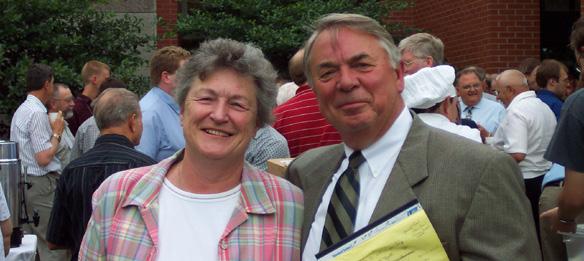
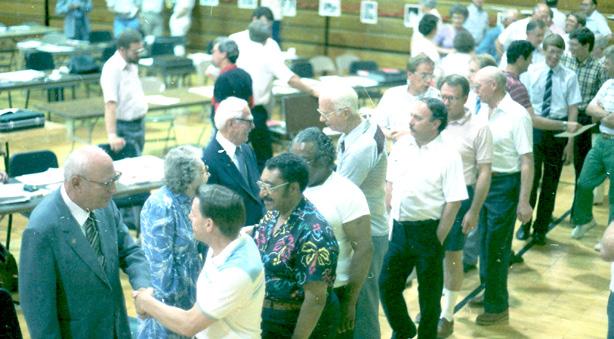
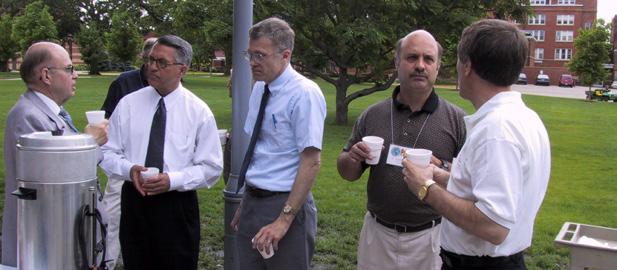

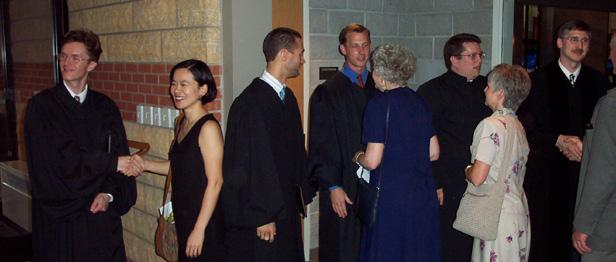
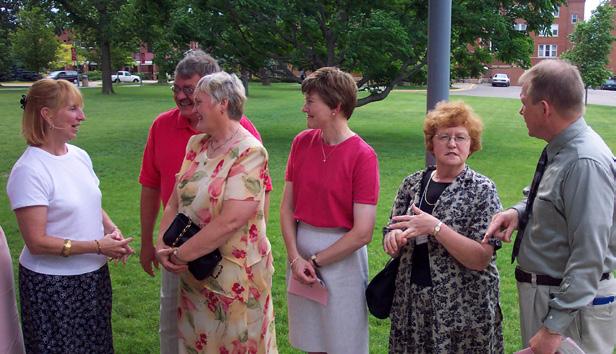
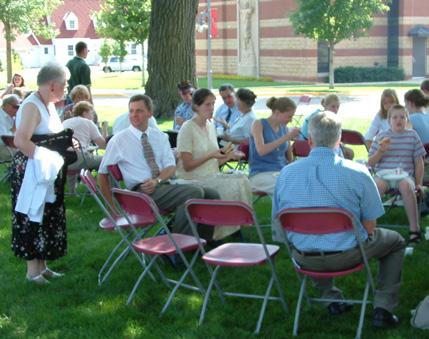

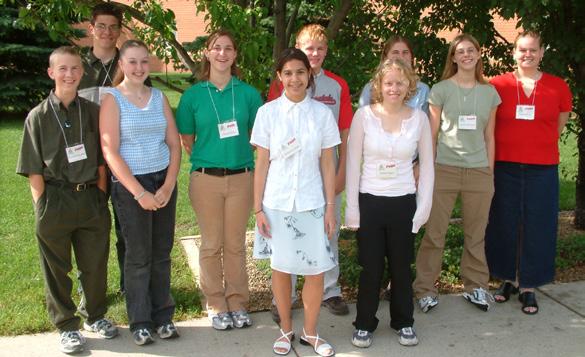
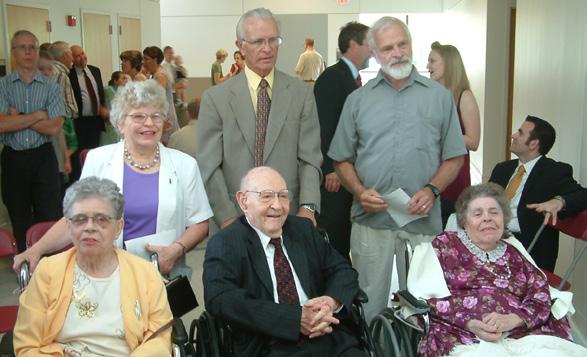
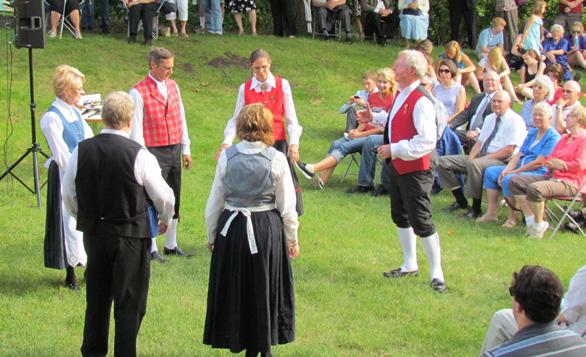
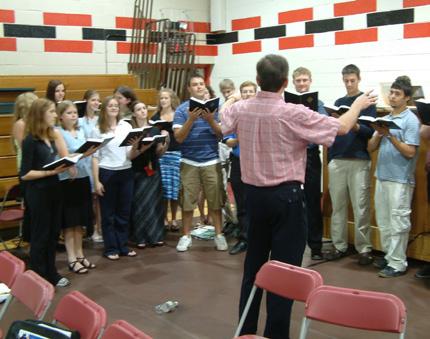
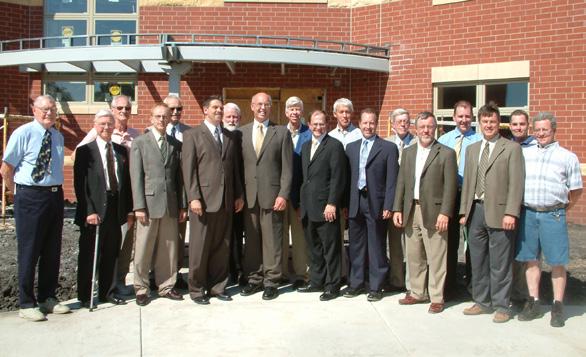

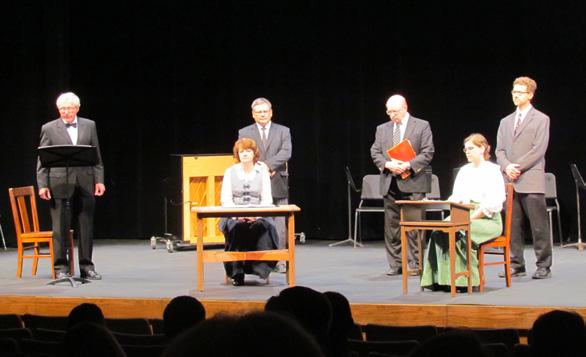


by CRAIG FERKENSTAD, Pastor Emeritus, Former Secretary of the Evangelical Lutheran Synod
The Evangelical Lutheran Synod holds a unique place among Lutherans in the United States. What makes our synod unique is not the commitment to the confessions of the Evangelical Lutheran Church. It is not limited to her heritage or culture. Rather, the ELS has a structure and polity of her own.
A first-time attendee to an ELS convention may be struck by the fact that the number of lay delegates from congregations might outnumber the voting pastors. At this past convention, for example, there was a possibility of 234 lay delegates and 125 voting clergy. Former President George Orvick wrote, “It
is of striking significance that our forefathers so developed the synod’s organizational structure that there were to be two lay delegates from each congregation and one pastor.” He continued, “This has been one of the strengths of our synod and one that we have perpetuated to this day.”
The reason for this practice is that the synod does not govern congregations, but the congregations have organized as a synod to work together. While retired pastors, missionaries, and teachers who have applied for membership are allowed to speak during convention sessions, they may not vote. This is the “bottom-up” structure of the ELS which differs from a “top-down” arrangement of many organizations and other synods. The officers and boards of the synod are servants of the congregations which they represent. Although there has been a need created by more modern business practices, at one time President George Orvick boasted that the ELS only had 1½ full-time employees.
It may be more surprising to many people that there is no executive committee or council of presidents that directs the work between conventions. Decisions are made during the annual synod convention with boards and committees carrying out those directives during the following year and reporting back to the congregations at the next convention. Each of the various boards is responsible directly and only to the members of the synod.
This practice is a reaction to the old Norwegian Synod which had a six-member Church Council [Kirkeraad]. This council originally consisted of the president of the synod, two pastors, and three lay members. Its commendable duty was to “execute its resolutions, and upon the whole to exert its influence in the interval between the Synodical sessions towards promoting the object of the Synod.” But, as the Rev. Christian Anderson later pointed out, this council became one of the underlying causes of the deterioration and breakdown of the old Norwegian Synod. The actions of the council were not widely known. It became easy for the synod’s members to let the church council handle matters and there was a growing lack of oversight and indifference among the members of the synod.
The influence of this council was not easy to resist. Pastor Anderson wrote, “Woe to the poor pastor who dared to oppose this Council and come into its disfavor!” When the Norwegian Synod was reorganized in 1918, great care was taken to leave authority in the hands of the congregations. Today, when the delegates and pastors gather for the convention, it is with the feeling of a family reunion. Strong friendships are nurtured by this annual gathering as many delegates return year after year and clergy are expected to attend every convention. This brings a sense of continuity.
This same polity exists for Bethany Lutheran College, Inc. which is comprised of the college and seminary. While technically being a separate organization alongside the synod, the membership of BLC, Inc. is identical to the membership of the ELS. The annual meeting is held concurrently with the synod convention. But whereas most institutions of higher education have only one governing board known as the Board of Regents, BLC, Inc. is privileged to have two governing boards. This is to provide a system of checks-and-balances ensuring that the college remains faithful to the doctrine and practice of the ELS. The Board of Trustees “govern Bethany Lutheran College and Seminary with respect to the property. All other matters of trusteeship and governance are assigned to the Board of Regents.”
Even membership in the synod is slightly different than may be found in other Lutheran bodies. The synod consists of congregations and individuals “who subscribe to the Constitution of the Evangelical Lutheran Synod and have been accepted into membership.” By virtue of congregation membership, all 15,000 members of ELS congregations are members of the synod. But there also is something special known as individual membership. This applies to both clergy and male teachers and is not automatically granted upon the
reception of a call into an ELS congregation but is awarded by the synod when an individual application is made.
What especially is different is that the ELS recognizes that there are men and women in special circumstances who also may make application for individual membership. Again, this harkens back to the early days of the synod after 1918, when there were individuals for whom conscience’s sake could not be members of their former congregations but were living too remotely to join a synod congregation. Although not being granted voting membership, provision was made for such individuals to profess their confessional faith along with their brothers and sisters in the ELS.
Finally, it should be noted that according to the synod’s bylaws, the synod is advisory to her member congregations. This does not mean that each congregation is allowed to do whatever it wishes. The synod cannot, for example, dictate the time of church services; but the synod does say that the word of God must be preached in its truth and purity. The synod is a group of people who have agreed to walk together in doctrine and practice.
There is something special about our Evangelical Lutheran Synod. In the synod’s 75th anniversary history volume, we are told “the flavor of the Norwegian Synod was evangelical in contrast to legalistic; the Gospel of God rather than the Law of God was the dominant theme in its work. There was conscious effort always to make a proper distinction between the Law and Gospel so that sinners would seek their salvation in Christ and not in the deeds of the Law.” That is still our goal today.
The synod has adopted a constitution, bylaws, and guidelines to administer the work and accomplish the purpose of the synod as stated in the constitution:
1. To carry out the command of Jesus Christ to preach the gospel to every creature.
(Mark 16:15; Matthew 28:19–20),
2. To contend for the faith.
(Jude 3)
3. To promote the development of Christian life within its membership (Galatians 5:22–25)
Against the Heavenly Prophets in the Matter of Images and Sacraments
Rev. Bryan Wolfmueller, St. Paul’s Lutheran Church, Austin, TX
How Christians Should Regard Moses
Prof. Mark DeGarmeaux, Bethany Lutheran College, Mankato, MN
The Bondage of the Will
Dr. Keith Wessel, Martin Luther College, New Ulm, MN
Bethany Lutheran College Sports and Fitness Center
Mankato, MN
October 30, 10:30 a.m. 2025 Bjarne W. Teigen
If you are interested in submitting an article for consideration to be published in an upcoming issue this year, please send it to the editor’s email at lutheransentineled@gmail.com.
The articles should be between 750-1300 words.
The themes for the last two issues of 2025 are:
September-October: The New Creation
November-December: The Incarnation